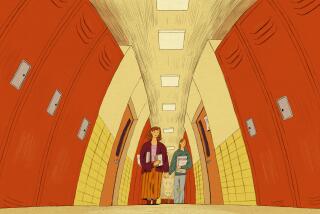Homework Isn’t All There Is to Learning
- Share via
I’ve known since our oldest child entered school that I was different from the other parents. At back-to-school night, when a teacher announced that he did not believe in a lot of written homework for first graders, I applauded--alone. The other parents turned to stare at me in disapproval.
A few years later, frustrated by the hours of homework our three children were bringing home each night, I wrote the principal to tell him that I felt like my relationship with my children during the week was essentially that of a homework monitor, and I resented it. Nothing, however, changed.
Now two of our children are in high school, where I would expect and support homework, of course. But last June, when our 11th grade daughter got a list of reading and writing assignments to complete during the summer to prepare for an advanced college placement test and to earn college credit (she’s only 15), I finally figured out my real objection: For most kids, mere acceleration of learning does not inherently enrich his or her education, and, indeed, it can well be counterproductive. Pressing students to learn to read at age 3 or 4 instead of 5 or 6 or studying geometry in the eighth grade instead of 10th doesn’t necessarily make them smarter. And it may rob them of time for other kinds of experiences that would make them better adults.
Let’s take the idea that top juniors in high school might take an American history course sufficiently rigorous that they could pass an advanced placement college-level exam. The sales pitch for the course is that it is a way to get college credit inexpensively and also would enable the student to take a lighter load in college or finish early.
But thinking back to my own educational experience, I remember that we studied history in elementary school, again in junior high and then again in senior high school, learning more each time. In college, the course involved reading multiple authors and taking a more critical view of history. I have to wonder if my 15-year old daughter’s understanding of American history is enriched by taking a college-level course now rather than taking both the high school and college courses in their proper time. I doubt it.
I believe we have confused acceleration of learning for enrichment.
Peer pressure is drawing more and more students into such an approach. Indeed, 15 times more students take the advanced placement exams than when I was in high school, and the number has doubled in just the past 10 years. These kids, who have been pushed from birth to achieve, believe that their college applications won’t measure up if they don’t include advanced placement and accelerated courses. So they line up--at Malibu High School, where my daughter is a student, 40 kids crowded into the summer school class--to get a head start on earning college credit. Of course, classes should be available to kids who are behind in their course work, but it is not necessarily healthy or productive for kids who are already in the middle and fast lanes of learning to spend all their summer hours in school.
Pushing kids to earn college credit is only the culmination of a series of misguided accelerations in children’s educational lives. We have friends who worry at birth whether their child will get into the “right” preschool. And my own children have nearly been buried in well meaning but high-pressure summer school and formal acceleration opportunities of every kind. They feel stressed and I feel cut out of their development. The notion of free time for family, church or other enrichment is all but lost.
My plea to parents is this: Don’t be seduced by mere acceleration. Summer school might be right for your child, but so might a long train trip with dad and mom or a visit to grandma. Doing homework every night might not be as important as going to a Bible study class or to Girl Scouts. Working in an ice cream store or volunteering at a hospital might be as much of a learning experience as collecting six units of college credit in 11th grade.
I doubt that either our work force or our society will be better off with people who did all their homework in summer school but never had time to grow and develop in other ways.






